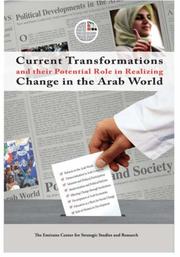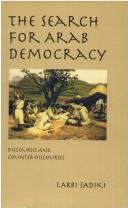| Listing 1 - 10 of 30 | << page >> |
Sort by
|
Book
ISBN: 9781138656154 Year: 2016
Abstract | Keywords | Export | Availability | Bookmark
 Loading...
Loading...Choose an application
- Reference Manager
- EndNote
- RefWorks (Direct export to RefWorks)
The Arab uprisings that began in 2010 removed four presidents and made more mobilized mass publics an increased factor in the politics of regional states. The main initial problematic of the Arab uprising was how to translate mass protest into democratization and ultimately democratic consolidation; yet four years later, there was little democratization. This book explores various aspects of this question while comparing outcomes in three states, Egypt, Syria and Tunisia.
Book

ISBN: 9780815722267 Year: 2011 Publisher: Washington (D.C.) Brookings Institution Press
Abstract | Keywords | Export | Availability | Bookmark
 Loading...
Loading...Choose an application
- Reference Manager
- EndNote
- RefWorks (Direct export to RefWorks)
Book
ISBN: 9780870032394 Year: 2008 Publisher: Washington : Carnegie Endowment for International Peace,
Abstract | Keywords | Export | Availability | Bookmark
 Loading...
Loading...Choose an application
- Reference Manager
- EndNote
- RefWorks (Direct export to RefWorks)

ISBN: 9789948008743 Year: 2007 Publisher: London : I. B. Tauris,
Abstract | Keywords | Export | Availability | Bookmark
 Loading...
Loading...Choose an application
- Reference Manager
- EndNote
- RefWorks (Direct export to RefWorks)
Book
ISBN: 9780199699247 Year: 2011 Publisher: Oxford, UK : Oxford University Press,
Abstract | Keywords | Export | Availability | Bookmark
 Loading...
Loading...Choose an application
- Reference Manager
- EndNote
- RefWorks (Direct export to RefWorks)
Book
ISBN: 9781137298515 Year: 2015
Abstract | Keywords | Export | Availability | Bookmark
 Loading...
Loading...Choose an application
- Reference Manager
- EndNote
- RefWorks (Direct export to RefWorks)
Fuelled by the suspicion that the European Union's democracy promotion efforts in the Middle East and North Africa over the past 20 years were not only ineffective but even counterproductive, this book critically reviews the practice and effects of international democracy promotion efforts vis-a-vis authoritarian regimes. How and under which conditions do authoritarian regimes cooperate on democracy promotion efforts by international actors ? And what does the Arab Spring tell us about the nature and prospects of these efforts ? Following a comprehensive analysis of cooperation on democracy and human rights in Euro-Mediterranean relations since the early 1990s, the author argues that the same set of factors facilitated both the cooperation of authoritarian regimes and their persistence during the Arab Spring. For authoritarian regimes with moderate levels of political liberalization and statehood, cooperation on democracy and human rights became part of their more 'successful' survival strategies.
Book
ISBN: 9783643902665 3643902662 Year: 2012 Publisher: Wien LIT
Abstract | Keywords | Export | Availability | Bookmark
 Loading...
Loading...Choose an application
- Reference Manager
- EndNote
- RefWorks (Direct export to RefWorks)
Book
ISBN: 9781588268785 9781588268532 1588268535 1588268780 Year: 2012 Publisher: Boulder, Colo. Rienner
Abstract | Keywords | Export | Availability | Bookmark
 Loading...
Loading...Choose an application
- Reference Manager
- EndNote
- RefWorks (Direct export to RefWorks)
Political systems --- National movements --- Arab States --- Authoritarianism --- Democratization --- Arab countries --- Politics and government --- Arab states --- Authoritarianism - Arab countries --- Democratization - Arab countries --- Arab countries - Politics and government

ISBN: 1850654891 1850654948 9781850654940 9781850654896 Year: 2004 Publisher: London : Hurst,
Abstract | Keywords | Export | Availability | Bookmark
 Loading...
Loading...Choose an application
- Reference Manager
- EndNote
- RefWorks (Direct export to RefWorks)
Book
ISBN: 9781626378179 1626378177 Year: 2019 Publisher: Boulder (Calif.): Lynne Rienner,
Abstract | Keywords | Export | Availability | Bookmark
 Loading...
Loading...Choose an application
- Reference Manager
- EndNote
- RefWorks (Direct export to RefWorks)
Whether democracy promotion should play a role in US foreign policy continues to be a subject of considerable debate, perhaps nowhere more than with regards to the Arab world. But looking beyond the 'whether', what explains why, where, ad how the United States promotes democracy ? What caused the shift from the Obama administration's support of the Arab Spring protests in 2011 to its retreat from democracy promotion on two years later ? What explains the Trump administration's focus on relationships with autocrats ? In the context of these questions, the author explores the tensions between interests and ideals in U foreign policy and the possibilities and limits of US democracy.
DEMOCRATIZATION--USA --- DEMOCRATIZATION--ARAB COUNTRIES --- USA--FOREIGN RELATIONS--ARAB COUNTRIES --- ARAB COUNTRIES--FOREIGN RELATIONS--USA --- Democratization --- Government policy --- United States --- Arab countries --- Foreign relations --- Democratization - Government policy - United States --- Democratization - Arab countries --- United States - Foreign relations - Arab countries --- Arab countries - Foreign relations - United States
| Listing 1 - 10 of 30 | << page >> |
Sort by
|

 Search
Search Feedback
Feedback About UniCat
About UniCat  Help
Help News
News